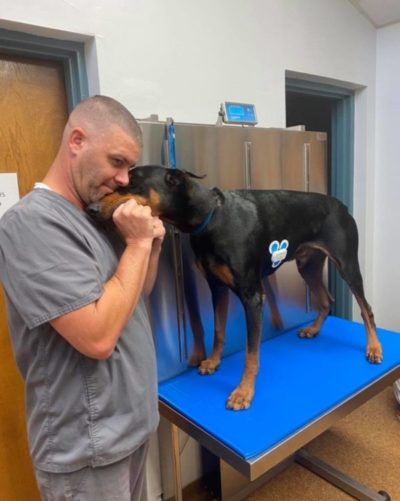
Did you know that over 50% of the Dobermans develop devastating heart disease, Dilated Cardiomyopathy? While majority are over 6 years of age, some affected Dobermans are very young. There are many genetic and environmental factors that contribute to DCM, with numerous studies underway to better understand this significant disease. DCM frequently progresses to heart failure, resulting in poor prognosis. Approximately 30% of the affected Dobermans may not show any clinical signs before succumbing to sudden cardiac death. This is a devastating and, in many cases, preventable situation. We can help you catch DCM early via a combination of Holter monitoring, auscultation, x-ray monitoring, echocardiogram (cardiac ultrasound via referral to a specialist), monitoring heart enzymes, and general DCM counseling. Breeders and owners interested in genetic screening can do so via NC State University or commercial genetic laboratories. At RBAH, we offer Holter Monitoring – an indispensable tool in early detection of abnormal heart rhythm that can lead to sudden death. To our knowledge, we are the only General Practice in the region with this equipment. Holter reports are handled by the Alba Medical, our partners in heart health.
We developed interest in canine DCM due to our heavy Doberman Pinscher patient load and lack of Board-Certified Cardiology service in the Memphis area. 24-hour Holter Monitoring could be a lifesaving tool because it allows for early detection and management of arrhythmias. It is also an invaluable tool for preservation breeders which aids in proper breeding selection. We advise any potential puppy buyer to consider whether the breeder has properly tested and tracked heart health in their program. Genetic testing is NOT reliable and NOT the substitute for Holter monitoring, echocardiogram and pedigree tracking. Other breeds commonly Holter monitored are Boxer, Cavalier King Charles Spaniel, Cane Corso, Great Dane, Cocker Spaniel, Bouvier de Flanders, Bull Mastiff, German Shepherd, Golden Retriever, Rottweiler, Great Pyrenees, Irish Wolfhound, Saluki, Labrador Retriever, Newfoundland, Old English Sheepdog, Beauceron, Rhodesian Ridgeback – or any dog with history or suspicion of cardiac arrhythmia.
European Society of Veterinary Cardiology Screening Guidelines for DCM in Doberman Pinschers recommend annual screening with both Holter and echocardiogram beginning at 3 years of age*. We have detected arrhythmias in Dobermans much younger. Genetic testing and ancillary biomarkers such as NT-pro BNP and cTnl could also be helpful; however, a recent study*** showed 6/48 affected Dobermans has no genetic markers for DCM1 or DCM2. There is no substitute for 24-hour Holter monitoring and echocardiogram. Please note that 5-minute ECG lacks sensitivity and specificity for ventricular ectopy detection. Combining Holter Monitor with NT-pro BNP can also be useful for oDCM detection (occult means the disease is present but not showing clinical signs or symptoms yet)**
You don’t have to be an RBAH Client to rent the Holter monitor. We are happy to work with your Veterinarian to outfit the dog with the monitor and submit the report. You can work with your family Veterinarian or Cardiologist to generate the best treatment plan for your dog. Have a Heart – Holter! Please feel free to call with any questions, or have your Veterinarian give us a call!
Sincerely,
Your friends at the Doberman Headquarters RBAH
References:
*European Society of Vet Cardiology Screening Guidelines for DCM in Doberman Pinschers
**Prospective Evaluation of NT-proBNP assay to detect occult DCM and predict survival in Dobermans
Lifetime Study of DCM in Doberman Pinschers Aims to Better Understand Fatal Heart Disease
***Assessment of PDK4 and TTN gene variants in 48 Doberman Pinschers with dilated cardiomyopathy
